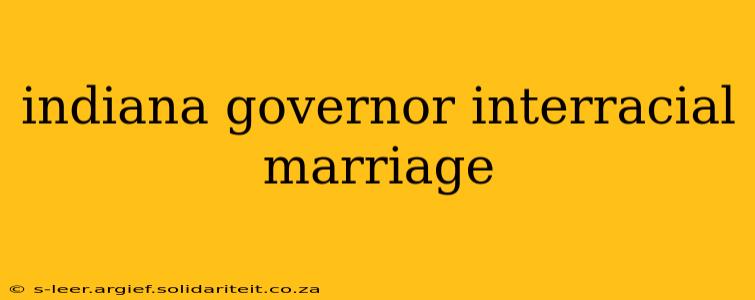Indiana, like the rest of the United States, has a complex history regarding interracial marriage. While the state's current laws fully support interracial unions, understanding the past is crucial to appreciating the progress made and the ongoing fight for equality. This article explores the historical context of interracial marriage in Indiana, the legal battles fought, and the current legal landscape.
What is the history of interracial marriage laws in Indiana?
Before 1967, interracial marriage was illegal in Indiana, as it was in many other states. These laws, rooted in racism and prejudice, stemmed from the deeply ingrained social and political structures of segregation. The exact dates and specific wording of these laws varied across states, but their intent was clear: to prevent marriages between people of different races. These laws were a significant obstacle to personal freedom and equality. Challenging and ultimately overturning these discriminatory laws required significant legal and social activism.
When was interracial marriage legalized in Indiana?
Interracial marriage was legalized nationwide in 1967 with the Supreme Court's landmark decision in Loving v. Virginia. This case, which involved a white man and a Black woman, declared state laws prohibiting interracial marriage unconstitutional. The ruling effectively nullified Indiana's anti-miscegenation statutes, paving the way for legal equality in marriage regardless of racial background. While the Loving v. Virginia decision had nationwide impact, its effect was particularly significant in states like Indiana that previously had explicit bans on interracial marriage.
What role did the Indiana governor play in the legalization of interracial marriage?
The Indiana governor, like governors in other states, did not directly play a role in Loving v. Virginia. The decision was a Supreme Court ruling, not a matter of state legislative action. However, the governor, along with other state officials, were bound by the Supreme Court's decision to enforce the law and uphold the constitutionality of interracial marriage. While there might not have been direct gubernatorial involvement in the legalization itself, the governor's role post-Loving was to ensure the enforcement of the new legal reality across the state.
Are there any current laws in Indiana regarding interracial marriage?
Currently, there are no laws in Indiana prohibiting or restricting interracial marriage. Indiana's marriage laws are gender-neutral and explicitly allow for marriage between individuals regardless of race or ethnicity. Any discriminatory practices against couples based on race in the context of marriage would be a violation of federal and state laws protecting equal rights.
What are the social implications of interracial marriage in Indiana?
The social implications of interracial marriage in Indiana, as in the rest of the country, are complex and multifaceted. While legal barriers have been removed, societal biases and prejudices can still affect interracial couples. Understanding these lingering social dynamics is crucial to promoting true equality and inclusivity. Continued education and open dialogue are important to address any remaining social stigma and to foster a more accepting and equitable society.
This article provides a factual overview and does not express any opinions or endorsements. Further research into the historical context and ongoing social implications is encouraged. Consult legal professionals for specific legal advice.
